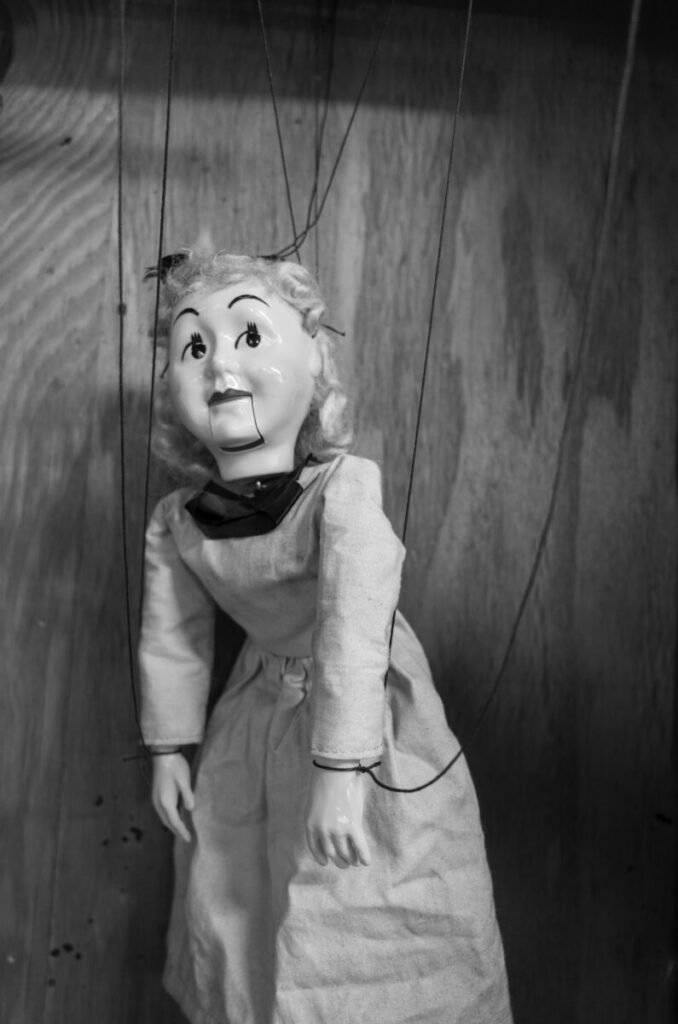
Bonnie usually loved the drive to Aunt Edda’s house. She’d peer out the backseat window as her mother drove along the section of highway overlooking the car factory where her father and Uncle Henry worked. Smokestacks jutted from the enormous building, filling the air with fluffy clouds. Bonnie always imagined her dad inside the factory feeding a giant furnace, making clouds shaped like cotton candy, just for her. She’d close her eyes and try to change the puff-ball clouds into bunnies with the power of a wish, but it never worked. Dozens of times, her older sister Alice told Bonnie she was stupid to think any of this was possible and called her a baby, but her cousin Louie, who was nine years old, same as Alice, would wait for Bonnie on his front step and ask her what flavor their fathers made that day. But they hadn’t visited in months, not since the factory closed. The workers were on strike, and as they drove past the factory today, no smoke puffed out of the stacks. The parking lot was empty. The train tracks were bare. The sky was clear blue with not a single cloud, and Louie did not wait on the step for Bonnie.
Aunt Edda greeted them at the door with suffocating hugs. Her dress smelled of sugar with a hint of burnt meat, just like the house but more intense. Uncle Henry sat on the living room sofa with the same sullen expression Bonnie’s dad had worn for too many weeks for Bonnie to count.
“Where’s Phil?” Aunt Edda asked.
“At home. On the couch as usual,” Mom said. “He didn’t want to get up.”
Bonnie thought her mother was wrong. Her dad being stuck to the couch didn’t seem to have anything to do with want. For weeks, he’d been in a sort of trance, not asleep like Sleeping Beauty or Snow White, but quiet and sluggish and unable to smile, often looking at something far away that Bonnie couldn’t see no matter how hard she tried. He only livened up in a grumbly way whenever Bonnie or her sister made too much noise or when Mom tried to coax him off the couch. Bonnie didn’t say any of this to her mother. Only an hour ago, Mom had put the new Elvis album on the record player and sang along to it. Bonnie didn’t see what happened. She didn’t hear what her parents said. But when the music abruptly stopped, Dad was off the couch and Mom was crying.
Edda gave Mom a second hug. “A nap never hurt anyone.” She turned to Uncle Henry. “Why don’t you go lie down for a while. That’ll give us a chance to talk.”
He left the room without saying a word, as if he, too, were under a spell.
The skin beneath Mom’s eyes was puffy and red again, same as before they left for Edda’s. Bonnie slipped her hand into her mother’s, but Mom let it go and pushed her hand away.
Aunt Edda herded Bonnie and Alice to the kitchen and threw open the pantry doors. An entire side was stuffed full of snack cakes—Zingers, Twinkies, and Ho-Hos. Packaged donuts and jelly rolls. Bonnie was so excited, she bounced up and down until she realized Edda could be a witch, fattening up the children before she stuffed them into the oven.
Alice tore open a box of Twinkies and took three.
“Only take one.” Mom tilted her head toward Bonnie and stared at Alice until she returned the extras.
“That’s just baby fat.” Edda squeezed Bonnie’s cheek. “A few cakes won’t make a difference.” She was a large woman herself, thick in the middle, with streaks of gray in her black hair that made her seem older than Mom, but Bonnie wasn’t sure. Her mom looked more tired than Edda today.
Mom sighed. “All right. It’s fine.”
“Go on down to the basement,” Aunt Edda said. “I think Louie’s there. He might have gone outside.”
“Ooh,” Alice said. They’d never been allowed to play in Edda’s basement before.
Mom wagged a finger at the girls. “Be quiet or else. And don’t wake your uncle.” She followed Edda to the living room, a formal room with uncomfortable furniture designed to keep children out of adult conversations.
While Alice shoved snack cakes into her crocheted shoulder bag, Bonnie pressed her ear to the wall and listened.
“Phil just lies there,” Mom said. “He hardly even moves. This strike is killing him. It’s killing me. I’ve never felt so alone.”
“What he needs is a hobby. Like woodworking.”
“I was thinking we could bake him a peach cobbler.”
*
Alice darted down the stairs, but Bonnie hesitated at the top and eased down the wooden, open-backed steps. With her hand on the iron rail, she tip-toed, craning her neck, trying to be as tall as her sister.
Down in the basement, dozens of marionettes, mostly bald men with pained expressions, dangled limp from the rafters. Several half-carved heads and unattached arms and limbs were scattered about the center of a large plywood table. One head had no eyes, its mouth wide open as if it had been frozen mid-scream. Scary tools were lined up neatly on one end of the table: wires, sandpaper, knives, pliers in different sizes, and chisels that could dig the bones out of children. Behind it, blocks of wood of varying sizes were stacked on the shelf next to oversized jars of maraschino cherries and marshmallow cream.
“Cool,” Alice said, her eyes on the puppets. She called out for Louie, but no one answered. She pointed overhead to a marionette, one of the men dressed in blue striped coveralls like their dad used to wear to work. Its head was bowed. “String broke. I bet I could fix it.”
Bonnie stared at the wide-open eyes of a wood-carved witch hanging from the rafter and was frozen in place until her sister plopped her bag down on the table, pushed Bonnie aside, and slid a chair under the witch. Fearless as always, Alice climbed up and touched the wart on the witch’s nose like it was a button that needed to be pressed. High on her toes, she rotated the crossbar and freed the witch and then the princess, leaving only the army of men and a knight in tin foil armor hanging overhead. “I call princess. You get the witch.”
“But I want the princess.”
“I called it.” Alice used her bossy mother tone. “Don’t knot up the strings.”
“I’m gonna tell Mom.”
“Do it. I dare you.”
Bonnie didn’t. Mom told them to be quiet, and maybe the quiet would help her figure out how to break the spell on Dad, to get him off the couch. Mom was always telling him he should be up and moving, but he never seemed to hear her, like he was trapped in a foggy forest and wasn’t happy there but also didn’t want to leave.
She took the witch, careful not to look it in the eyes.
In minutes, Alice figured out how to make the princess walk and sit and curtsy. She pulled two packaged Ho-Hos out of her bag and ate them both.
Across the basement, something creaked. Light filled the room, and a second creak darkened it again. Something skittered here and there, toward them and back. Alice nudged Bonnie with her elbow. “Get behind me.” She held the princess by the neck, as if she planned to beat the intruder with the puppet’s wooden head.
A boy’s voice called out from beneath a shelf. “Be careful with the strings.” It was their cousin Louie. He was as chubby as Hansel, ready for the oven.
“Don’t sneak up on people like that,” Alice said.
“It’s my house. I can do what I want.”
Alice was the oldest by three months, several inches taller than Louie, and the presumed leader even if it was his house. She ignored him and turned the wooden crossbar this way and that until the strings were straight and unknotted and taut.
He climbed onto the chair and retrieved the knight. In an instant, he brought the puppet to life. The knight thrashed his sword in the air like he was fighting invisible demons and then bowed low to the princess. Louie made it look easy even though his puppet had more strings and an extra bar on the controller. Bonnie applauded, but Louie didn’t seem to notice her. He slid off the chair and gestured toward the stairs. “After the princess.” But Alice let him take the lead, and they scrambled up the stairs ahead of Bonnie.
Louie peeked into the living room before he crept across the doorway and gave Alice the all-clear. As he sprinted down a hallway and into his parents’ bedroom, Bonnie felt as though she were in an odd dream, a version of her life where everything shifted and her favorite cousin could no longer see her.
The room was dark and still. Uncle Henry lay in the center of the bed with his bald head resting on two pillows. A pair of blue coveralls was draped over the footboard, as if he intended to return to work that day. But Mom had said the strike might go on for weeks.
Bonnie could always hear her dad breathing on the couch, especially when he slept, but Henry wasn’t making any sounds. When Aunt Edda started cackling from the other side of the house, Bonnie worried her aunt really was a witch. “Did she kill him?”
“Did who kill who?” Louie asked, speaking directly to Bonnie for the first time.
Bonnie shrugged, afraid to name his mother. She pointed at Uncle Henry.
“He’s just sleeping.” Louie climbed onto the bed.
“We’re not supposed to wake him,” Alice said, but it was too late. Louie petted his dad’s cheeks ceremoniously, first one and then the other. A smile appeared on Uncle Henry’s face, but his eyes remained closed. Louie kissed him on the top of his bald head, and his eyes opened. The spell was broken.
“A touch to each cheek and a kiss on the head,” Bonnie whispered, repeating it twice so she’d remember the sequence to use on her dad.
“Can we do a play for you?” Louie asked.
The corner of Henry’s lips turned up just enough to form an answer that seemed like yes.
Without any discussion of what the story would be or who would do what, Louie expertly worked the knight, but Alice took charge of the story. Her princess became a dark princess, the cruel leader of the entire kingdom. She put a spell over the knight and made him her minion.
“But I’m the witch!” Bonnie said, her puppet limp at her side.
“Then be the witch,” Alice and Louie said at the same time.
Bonnie pouted her lip, but no one noticed. “You are under my spell,” she yelled. “You will dance!” She used her free hand to point the witch’s hand toward the record player.
“You gotta move it with the strings.” Louie put the needle on the 45, “Spirit in the Sky.”
The older two made their marionettes dance around each other like they were real royalty, but Bonnie didn’t know how to dance for a ball. She improvised, letting the music move her. She wiggled her butt with the witch in her hand and turned circles, bouncing the puppet as she bounced, never looking down at the terrifying expression carved into the witch’s face.
The children danced over and over again to the same song until their mothers came to the door and tried to hush them. They fell silent when Louie pointed at his dad, who was convulsing with laughter, flushed at the cheeks, no longer still. Uncle Henry scooted to the edge of the bed and turned up the music. When he stood and took Edda’s hand, Bonnie wiggled her bottom with more vigor and soon the whole family was under Bonnie’s spell. Even her mother was dancing. Bonnie closed her eyes and imagined her dad rising from their living room couch and dancing to the music, too, holding Bonnie in his arms, their cheeks pressed together. When the song ended, Louie played it again and they danced until the smell of peach cobbler filled the house.
*
On the drive home, Bonnie repeated Louie’s incantation in her mind so she wouldn’t forget it, never once looking up to the sky. She was still upset her mother said no when Bonnie asked her aunt if she could bring the witch puppet home. “But I need it,” Bonnie had said. Even now, she felt the sting of her mother’s hand on her bottom and the sting in her heart when Louie let out an amused gasp and agreed with Alice that Bonnie was acting like a baby.
When they returned home, Mom and Alice fetched the peach cobbler and Edda’s roast beef from the car. Bonnie ran into the house alone, intent on performing the spell, but Dad was already awake.
She ran to her bedroom and tied yarn around the arms and legs and neck of her Baby Tender Love as quickly as she could. By the time she returned to the living room, her father was resting his eyes again, an empty bowl on the coffee table, only traces of cobbler crumbs and peach goop remaining. Bonnie went to the record player and found the Elvis album shattered, the record player’s needle broken. No wonder her mother had cried. Bonnie felt like crying, too. She stood before her dad now, too afraid to touch him. She held her doll by the strings but couldn’t remember the words to the song they had sung, so she made up her own song and sang it loudly to the same tune and prayed the magic would work.
“Quit it, Bonnie!” Mom said from the kitchen doorway. “Go to your room.”
“No!” Bonnie said and wiggled her butt, swinging the doll so hard it smacked her dad’s arm.
Her dad sat up quickly and looked at her like he might break her doll the way he’d broken Mom’s record player. Bonnie darted out of the room and down the hallway, but when she heard her father speak, she stopped short of her bedroom and ran back and peered at them. Mom was sitting next to him on the couch. He had his arm around her and apologized.
Bonnie tried to untie the strings on her doll but only pulled them tighter. She hugged her doll as she went to her parents. She sat next to her mom, but they both looked at her like they didn’t know her at all, and once again she felt like she was in a strange off-kilter dream. While Dad glared at Bonnie and Mom said, “No cobbler for you,” Alice silently slinked across the living room with two overfilled bowls. She gestured for Bonnie to follow her to their room.
“Nice puppet,” Alice said as they ate the dessert in the bottom bunk with the doll and Alice’s bag between them. She smiled oddly when she untied the doll’s strings. “I had the same idea.” Alice dumped out the contents of her bag: wooden body parts, wire, and a sheet of sandpaper plus a small chisel and pliers. The two heads both had smooth, uncarved faces.
None of it seemed frightening now to Bonnie. She picked one up and ran her hands over it and felt a lightness inside of her, a cloud in her belly that could lift her up to the sky. Anything was possible.


Share this post with your friends.

